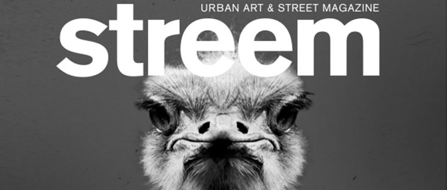Streem – A street magazine pARTicipating to social inclusion
by Nicola Popovic
I look at the picture of a Serbian artist whose work is being exposed in my neighborhood. I should really go, I think to myself, while I continue reading the magazine I just bought:
…music performance, comedy shows, art galleries, short stories…
Cultural events are everywhere in Berlin. The train bringing my friend and I home rumbles through the colorful overload of creativity reigning in this city. I look at the man who just sold me the magazine Streem I am flicking through. He is probably my age and is still talking, telling me about the many supporters the magazine has. The list includes soccer players, actors and local politicians. He slurs, his eyes blink incredibly slowly while his head slowly moves back and forth. His brown hair is held back with a baseball cap.
He lives on the street and is visibly not pampered with regular warm meals, showers, a bed and a social network that can hold his hands during rainy summer days or harsh winters. Even though our everyday realities could not be more different, we chat along about photography, street art and the articles inside the magazine. His eyes lighten up suddenly and he looks at me with a certain excitement.
I had given him 2 euros, which he still holds between his fingers while leaning against the train poll. The recommended price is 1 euro 50, but is ultimately determined by the buyer. 100% of the selling price goes to the seller. Other magazines sold on the street need to be previously bought by the seller for a minimum price.
A week later, sitting with the same friend in a café, we meet another seller. He tells us that he can give a paper for free if someone interested cannot afford it. He himself has read the articles over seven times and his favorite one, which he recites with passion, around 23 times. He talks about “resilience”, street art and Nordic Symbols in nationalist propaganda. He emphasizes on the fact that he does not want to see what the buyer gives in order to prevent his “human judgment” from being influenced by the exchange of money. He says he wants to get people interested and he is certainly succeeding in doing so. It is fascinating to have a light-footed but deep conversation, not about the social difference that exists between us, but on the creative ideas we just read about.
Streem not only gives the seller an opportunity to gain a legal, safe and respectful income, but also promotes tolerance and respect towards homeless people through its articles. People living on the streets have the opportunity to tell their personal stories, by being interviewed. The magazine publishes one such interview per edition. It is not about pity, but about giving a respectful recognition to the seller, so they write.
The reasons behind the lack of productive activity are often assumed and form prejudice and judgment. Most people do not look at the beggars standing at the subway entries. Selling a magazine is different from begging, though. It is offering something in exchange for money. It means participating in the circle of production and consumption that has become so important for social inclusion in capitalist societies. It offers an entry point to respect and more tolerance for the ones who stepped out of societies or even fell.
Our societies are built on economic income and capacity, which is converted into a social value. Access to justice, health, and education depend on such value. We cannot ignore the economic component of human rights. The difference between de jure and de facto exercise and protection of human rights often depends on euros and dollars. Social exclusion is one hardship on the poor in wealthy countries and is often under-estimated.
But Streem is more than just something to sell or another street magazine. It is an entry point for conversation, because the seller is interested and able to convince through ideas, overcoming social, economic and other differences. Art is not only a creative expression. It can also be an income, a last resort for the ones living outside conventions, as well as and a means towards social inclusion.
Streem: http://www.street-mag.de/
Supported by Berliner Kunstverein Genius Art Corp e.V. and many others.




Leave a Reply
Want to join the discussion?Feel free to contribute!